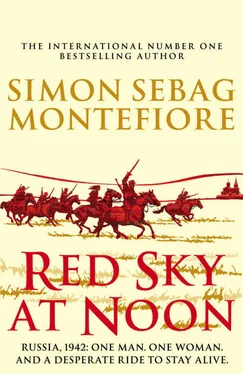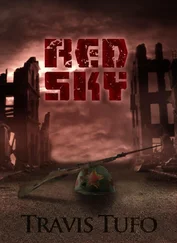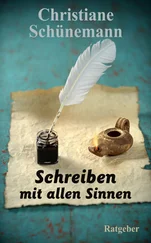They walk amongst the sheaves towards a haystack at the end of the field. Benya longs to throw himself into it; on impulse, he hands the doctor his rifle and runs and jumps and lies back kicking his legs in the air. The hay is sweet, prickly, bright yellow. But something twitches beside him. A rabbit maybe. Or a bird.
‘Careful,’ calls Kapto, coolly raising the rifle as Benya, spooked, jumps up.
‘What the hell? It’s something big,’ Benya says, drawing his pistol.
‘Come out!’ says Kapto. ‘We won’t hurt you!’ He pokes at the hay with his rifle. The hay slides off it and a child stands up, a little girl in a ripped floral dress, very frightened, black eyes, long auburn hair with a side parting held in a clip. She is matted in mud.
Benya kneels down and puts out his hand, coaxing her forward. ‘It’s all right,’ he says. ‘We’re Russians. Where do you come from?’
She points to the west, towards the smoke and the occasional shots.
‘Where’s home?’
‘Dnieperpetrovsk.’
‘That’s a long way away.’
She nods.
‘How old are you?’
‘Five.’
‘Where are your parents?’
‘They took them.’
‘Who?’
‘Schuma and Germans. Are you—?’ She starts to shake.
‘No, no, we’re Red Army, not Schuma. Where are your parents now?’
She looks behind her and starts to cry. Benya notices that her legs are scratched, her little dress is in shreds, and her knee is bleeding. ‘They left. We were all in the hole. I waited. When it was dark I crawled out and ran away.’
Dr Kapto goes on one knee beside Benya and takes over the conversation. ‘You’ve been running all night and all day?’
She nods.
‘You haven’t eaten?’
She shakes her head.
‘You’re bleeding. May I see?’
‘He’s a doctor,’ explains Benya. She relaxes and Kapto examines her knee.
‘You ran through wire and cut yourself, quite deeply. I need to stitch you up. Will you come with us? I can carry you?’ He opens his arms to her and, slowly, she comes towards him and he hugs her and she sobs. Kapto is so tender with her that Benya fights the urge to cry too as they walk back together to the village.
In the Red Cross tent, Tonya’s smudged face lights up for an instant. She and the doctor have saved many children together. Perhaps children are the one part of her job that pleases her, Benya thinks. He watches the child eat; then Kapto stitches her leg with Tonya assisting.
Eventually, she falls asleep, and Benya and Kapto light up Africas and stroll into the village.
Outside, the orange sun has sunk so low that Benya feels he can look right into its bloodshot face and feel the red heat through his eyelids.
‘What do we do with her?’ asks Benya.
‘Well, she can’t go back and we can’t leave her here,’ says Kapto.
They hear the heavy clip of hooves down the tiny street ahead of them.
‘Melishko is back, Melishko is back!’ Benya hears his comrades shouting. He feels a surge of relief. Thank God for Melishko; thank God for Kapto.
Each man had saved his life.
In another world.
In the Camps, Benya was too old for Hard Labour. He was over forty, and although there were lots of other older men there, most of them died in the first weeks. The gold they were mining out of the mountain lay in the iron ore fifteen metres underground. After the earlier shift dynamited the rock, Benya’s job was to heap the loose boulders on to his wheelbarrow and, balancing precariously up and down along the twisting wooden walkways high above the mine, push it to the conveyor belt in the steamshack. It was back-breaking hard work. If the wheelbarrow tipped over, neither he nor his fellow Zeks would be fed and he would be beaten. If prisoners were too exhausted to move, the guards simply shot them. His quota was seven cubic metres of soil and rock per day.
Then suddenly, after just a week, the light dwindled and the snow came. It was winter, grinding Kolyma winter, and the snow was so deep, the wind so strong, the blizzards so blinding that even around the Camp there were ropes to hold on to to get to the dining block. Winter clothing was issued – boots, padded coats and mittens – but the clothing was too thin, and the prisoners were always freezing. At roll call each morning, shoved into lines by Fats Strizkaz and his Trusties brandishing truncheons, the prisoners beat their own bodies with their hands to stay warm, and friends spotted the whiteness that warned of icebite. That’s when Benya first met Melishko, who’d lost his teeth and fingertips to Beria’s torturers.
‘Rub your nose,’ he said to Benya one day, ‘or you’ll lose it.’
It was night-time for nine hours a day, with the temperature sinking to minus forty. Men lost noses, fingers, toes; one man who urinated outdoors lost his penis when his urine froze; those with dysentery sometimes didn’t get up again, glued to glacial faeces. Yet Benya learned to find gems and sparks of joy even in this hell – a delicious piece of bread, the chance to rest an extra few minutes – and the smile of a new friend, Shishkov, another Political who worked with him. Politicals were cautious, never talking of their cases unless they really trusted someone. ‘My name is Nothing, my surname is Nobody’ – ‘ Zvat nikto, familiya nikak ’ – was what they said. But Shishkov immediately knew who Benya was. ‘I was one of your readers,’ he whispered one morning. Benya came to trust Shishkov, who was one of those prisoners known as ‘Jokers’ – sentenced under Clause 159.10 for ‘counter-revolutionary agitation’, usually for telling a joke about Stalin: ‘Quite a funny one,’ said Shishkov.
‘Please don’t share it,’ retorted Benya.
‘I have another about Beria!’
They managed to laugh.
Shishkov had once been very important; he’d been Second Secretary of the Kherson Party until denounced by his brother-in-law for his one-liners on Georgian geniuses, and was one of those owlish, bespectacled, sensible people who always looked older than his years. He was kind to Benya and taught him how to work the wheelbarrow, how high to pile the rocks, how to avoid a crash, and how to inflate the quota: the entire Camp was engaged in inflating their quotas, a science of mendacity known as tufta .
‘Remember,’ said Shishkov, ‘love is life, love is what put your stars in the sky. Look at the moon. The moon shines everywhere and if you love someone, they can see the same moon! I call it Moon Magic. Loving will keep you alive.’ Benya knew that he thought constantly of his wife and his two daughters.
The prisoners rarely cried or gurned, realized Benya; the faces of those in the deepest pain were set in brittle, expressionless masks – even as the suffering tore them to pieces within.
If Benya had not been chiselling away at the rock and carrying stones he would have died of cold, yet the work itself was so punishing that even during the first day he staggered rather than walked. If the brigade’s quota of rock was not shifted each day, the prisoners received less food. Even so, the watery swill with its scraps of whale fat and herring bones daily ladled out from the Cauldron, plus the paika , the bread ration, in the dining block was not enough for any of them.
Just a week into winter, Benya noticed his Political friend, Shishkov, was deteriorating. His face was touched with death, his skin yellow, his nose jutting out; it seemed to Benya he was just gristle, bone and parchment. Benya begged his older friend to eat more, to find the will.
‘I realize that I will never see my children again,’ replied Shishkov, tears running down his face. ‘I am dying of hunger.’
Читать дальше












